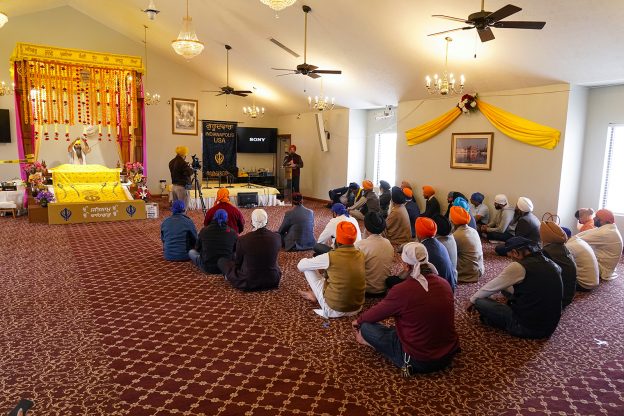
(RNS) — In April 2021, a gunman stormed a FedEx facility in Indianapolis, killing eight people and injuring several others. Four of the victims were Sikh Americans, a community that has long borne the brunt of hate and violence in this country. For many, the tragedy was yet another horrifying example of how Sikh Americans are often targeted simply for being who they are.
I found myself in deep mourning for my community and in awe of the limitless resilience shown by families and friends of the victims. I’ve spent much of my life advocating for and defending my community with incredible partners, like the Sikh Coalition.
This week marks a huge step forward, not just for us, but for marginalized communities across the country.
The White House’s rollout of the first national strategy to address Islamophobia and related forms of hate, including anti-Sikh hate, finally implements changes in policy for which the Sikh community has long advocated. The strategy includes a slate of other historic efforts to eliminate longstanding discriminatory practices against our Muslim, Arab and South Asian neighbors.
In my work as a professor of Interreligious Studies at Union Theological Seminary, I have the opportunity to teach the history of Islam, Sikhism, Buddhism and other faiths. One of the observations that comes through most clearly in studying history is that people are most likely to thrive in societies where everyone is given equal opportunity to live freely and where governments and citizens work proactively to quash bigotry and discrimination.
Sikhi (or Sikhism) is fundamentally a tradition that stands against discrimination. It would be easy to pretend that I don’t have a common interest or share many of the same hopes and fears as my Muslim neighbors. But it’s because of my tradition and lived experiences that I recognize how racism is a blunt force that bears down on all of us.

Sikh motorcyclists participate in the Parade of Faiths in Chicago on Aug. 13, 2023. The parade preceded the Parliament of the World’s Religions, which began August 14. (RNS photo/Lauren Pond)
The strategy tackles the shared discrimination of Muslim, Arab, Sikh and South Asian communities face in a number of different ways. For example, acknowledging that young Sikhs who wear a turban are twice as likely to be bullied as the average American teen, the strategy is bringing the Department of Justice, the Department of Education and Health and Human Services together to form “Federal Partners in Bullying Prevention” to assist schools in addressing bullying and harassment related to race, color, national origin, ethnicity, shared ancestry and religion.
In addition, it directs the Department of Education to engage with Sikh community groups to directly hear and act on their concerns.
The strategy’s commitment to increase the physical safety of the Sikh community is also notable, with special attention on educating state and local law enforcement about the dangers of transnational repression, a growing danger for Sikhs worldwide in recent years. Moreover, it takes steps to direct millions in federal funds toward security for faith-based institutions, including gurdwaras. Knowing that the latest data shows the highest number of hate crimes being committed against Sikhs since the FBI began tracking them, these funds would go a long way toward preventing further tragedies.
The attack in Indianapolis shook our community to its core. But it wasn’t an isolated incident. It was part of a long and painful history of hate against Sikhs in America — the desecration of gurdwaras across the country and the countless acts of discrimination, harassment and violence Sikhs endure every day. It’s also inseparable from the anti-Islamophobic sentiment that has marred the lives of countless Muslim Americans. I’m heartened to see a growing and broad recognition across the country of how institutionalized racism harms us all and enables the type of attacks against Sikhs, Arabs and Muslims that have become all too common.
Sikhs are better positioned than most to recognize this truth. We are a people defined by seva, or selfless service, a show of our commitment to loving the world around us. We are naturally drawn to the work of justice and will never stop advocating for people suffering from the burden of discrimination, which we know so well. This White House strategy gives us tools that we’ve never had before to defend ourselves and our neighbors.
We now have both the challenge and opportunity to use these tools to defend our communities and express our faith through service and civic engagement. Discrimination and hatred may rise, but with our faith and an inspiring coalition of partners, I feel better equipped than ever to fight back.
